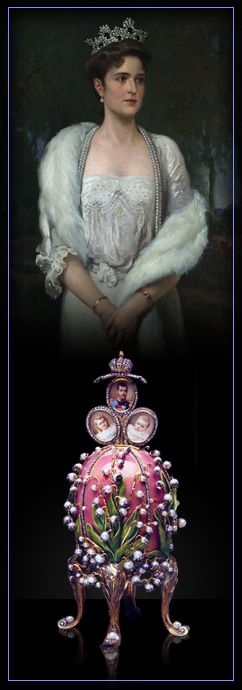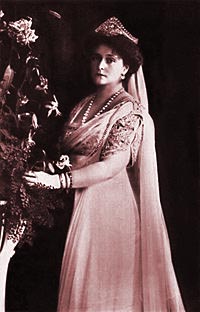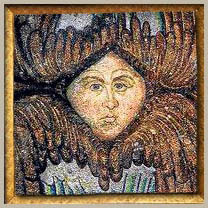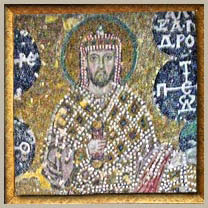This page from the Hagia Sophia website is about the famous 15th century image of angel on the left side of the apse whose face was recently uncovered


 Chapter IXFirst Charities, and Life from 1896-19010n the advice of the Grand Duchess Serge, the Empress had planned a little informal entertaining for the following winter which would help her to know more of St. Petersburg society. Nothing could come of this plan, however, as another baby was expected, and the Empress was far from well. She had to lie up for months, and spent seven weeks actually in bed. When she was up she was again a martyr to sciatica, and had to be - wheeled about in a chair. (The Emperor's diaries make frequent mention of it.) The Empress was always very unwell before her confinements. The general public did not know this. It was contrary to Russian Court etiquette even to mention the health of the sovereign or his wife, and the Empress herself was always shy of letting anyone know of her condition, and hid it as long as she could. All her children, except her eldest daughter, were born in the spring or early summer, so that she was generally incapacitated in the winter at the time of the St. Petersburg season, without its being known that it was her health alone that kept her so much in retirement. Further, she insisted on nursing her babies, which was an additional tie. This she considered a mother's sacred duty, though it probably exhausted her physically far more than she realised, as she tried at the same time to carry out her official duties. The Empress certainly had bad luck where her health was concerned. In the years when she was neither expecting nor nursing a baby, she invariably fell ill. One winter she had influenza three times; another year she had measles ; then the children were ill. There seemed to be always something that at the last moment prevented the Empress from giving the smaller receptions through which she would have known society better and have become better known herself. She could, herself, have done very well without fétes and amusements. These "meant nothing to her," as she wrote to Princess Louis. Her home life was ideally happy. She grudged every moment away from the Emperor and her children. But the Emperor was a very busy man. She could never be long alone with him. Every party he attended, every hour he spent with her, was paid for by long and late hours among his papers. As time went on, her increasing family took up more and more of her attention, and she gave up the struggle to contrive to make time in which to see people outside her immediate and easily accessible entourage. The Empress took a great interest in the development of this work. She was a really enthusiastic philanthropist. She loved to think out fresh schemes and put them in action. She was practical and gave minute attention to every detail ; she had wide conceptions, and brought a personal element into everything. She always plunged straight into the subject under discussion, the most practical suggestions and those that enlarged and improved on the original project generally coming from her. All those who came in touch with this side of her character speak with the same admiration of her clear head and her sound common sense. She lost all self-consciousness when she was speaking of the subjects that interested her, and at once put her fellow-workers on an easy footing. In particular, everything to do with infant welfare was of interest to her. There was much to be done in that special line in Russia, and the Empress was very anxious to take this up actively. Another favourite scheme was a school for nurses and housemaids. She speaks of having written to England for "rules to try and go by a little," and modelled her school on Princess Christian's School for Nurses in London. This was also carried through by her, and the school was opened at Tsarskoe Selo in 1905, after considerable difficulty. She visited it regularly, planning improvements and enlargements till the last. Speaking of these projects, the Empress wrote to Princess Louis (June 17th, 1902) that "All new things are difficult, but awfully interesting when one takes them into one's hands-the only way to make things progress quickly." In all her charity work the Empress had to fight not only against inertia, but often against great opposition to the introduction of new ideas. The difficulty of providing funds for her schemes was generally used as an argument against them, for there was not in Russia that ready response from private charity which is usual in England, and nearly all the charities had to be supported by the Government. When she managed to surmount this obstacle, she had always to take precautions that her ideas should not be shelved, but really carried out. She had often a hard fight to carry out her plans, and although she succeeded in doing much, there were a great many projects which she was never able to put into execution. The Empress often had to draw heavily on her own purse for her charities. Strange as it may seem, the Empress's private fortune was not very large, and she had to curtail her private expenses to meet those of her charities. She was very generous in her donations. It is not generally known that the Empress provided for the upkeep of her school for nurses out of her own pocket. During the war an unheard of thing occurred (October 1915). New petitioners were told in her secretary's office that they would have to wait till January 1916 to get their remittances, as the Empress had spent all her yearly income in giving generously right and left to war charities, widows and orphans. During the famine year of 1898, for instance, she gave 50,000 rubles out of her privy purse to relieve distress in the famine districts. She realised the need of professional schools for girls, and wanted to transform the so-called "Patriotic Schools " into more modern establishments. This, however, proved beyond her power. Innumerable objections were raised, and the officials responsible for these schools could not see the need for any alteration. Alexandra Feodorovna only made enemies for herself among the great ladies who were the patronesses of the schools which she had pronounced to be out of date and unpractical. She took this idea up again during the war (1915-16), but had not time to carry it out. During the spring of 1897 Princess Henry of Prussia took the opportunity to come and stay with her sister, leaving some little time before the Grand Duchess Tatiana was born. In the spring and summer of this year, all the sovereigns to whom State visits had been paid came in their turn to Russia. The Emperor Franz Josef was the first, accompanied by the Archduke Otto, but the Empress's health precluded any public appearances on her part. This visit was followed later in the summer by one from the German Emperor and Empress, and in the autumn came the French President, Felix Faure, accompanied by Admiral Gervais, General de Boisdeffre, and M. Gabriel Hanotaux. All these receptions were arranged on much the same lines. The magnificent palace at Peterhof (the Imperial Family did not reside in it themselves), with the park that surrounded it, gave the festivities a more effective setting than did the stiff Winter Palace in St. Petersburg. The command performances given in their honour were always greatly appreciated by the foreign guests. The Ballet and the Opera singers from the Imperial theatre generally appeared in one of the small court theatres at Peterhof, or at the camp at Krasnoe. A particularly good ballet was given, on a beautiful summer evening, on one of the islands on the lake in the Peterhof Park, on the occasion of the visit of the German Emperor. When the Court was at Peterhof the Empress often went with the Emperor to the camp at Krasnoe Selo, and during manoeuvres they sometimes stayed there for several days, living in small wooden houses of the datcha type. She was a true soldier's daughter, and enjoyed these expeditions, military pageants, and reviews, and camp life with bands playing, bugles sounding, and regiments marching. The Emperor, too, was happy in reviving the old associations of his soldier days. The Empress was as appointed honorary colonel of the Guard Lancers and was very proud of her regiment, taking great interest in all the officers and men. In May 1903, the jubilee of the regiment, she was present at the review in Lancer's uniform and rode at the regiment's head. Every autumn during these first years (up to 1905) the Imperial Family went to the Emperor's Polish shooting lodges, Skierniewice, Spala and Belovege. Sometimes the Empress walked with the Emperor for hours while he shot, for she always entered into all her husband's interests, although she never handled a gun herself, as she shared Queen Victoria's opinion that this was "a mannish pastime."When she was not walking with the Emperor she would ride, or drive her four-in-hand through the vast forests in which the lodges stood. These country sojourns away from towns, noise, bustle and State entertaining were a delight to her. The Emperor was a great walker, and whenever they were together in the country his wife accompanied him on his longest walks. He went at a terrific pace, and even his gentlemen had the greatest difficulty in keeping up with him, but the Empress would never admit fatigue. The long walks she took with the Emperor in early days almost certainly laid the foundations of the heart trouble from which she suffered so badly in later years. The Emperor never realised how tired she must have been, for she was always game to the end. She describes one of these shooting visits to her sister, Princess Louis, in 1897: "Generally out for ten hours - bisons, roebucks, stags, elks, wild bear, capercailzies." These were "their" holidays. There were no ministers in attendance except Baron Freedericsz. Only his papers followed the Emperor always. After one of these visits (1897) the Emperor and Empress went to Warsaw to see the capital of their kingdom of Poland. They spent three days at the Lazenki Palace, and were very well received by the Poles, the nobility giving the Emperor a million rubles for charities. All the Polish ladies came to the Empress's reception at the Palace, and the young men of the aristocracy, on their own initiative, kept order in the streets during the Imperial visit. In 1897 and 1899 the shooting in Poland was followed by visits to Darmstadt. On the first visit, the Imperial couple laid the foundation stone of the Russian church that was built in Darmstadt in memory of the Empress Marie Alexandrovna, the Emperor Nicholas's grandmother, who, it will be remembered, had also been a Hessian Princess. The Emperor entrusted the paintings and mosaics for this church to Vasnetzov, the artist whose paintings had so charmed the Empress at Kiev, and it was consecrated in 1899. It is the only specimen outside Russia of this great Russian painter's work. Who knows what has been the fate of the churches in Russia that were decorated by him? During this journey abroad both the Emperor and the Empress came into contact with wider ideas, and heard freer and more varied opinions on political and general questions than they could do in Russia, in the limited circle from which all sovereigns find it so difficult to escape. At Darmstadt the Imperial couple went about a great deal with their hosts. They met all kinds of people, for the Grand Duke of Hesse, a liberal and intellectual man, liked to hear and discuss every kind of general question, and they always returned with a store of new ideas. In later years these trips abroad became rarer. The Emperor was more and more tied down. The Empress never even contemplated the possibility of going anywhere without him. One day of separation meant a wrench to her, and for the first ten years of their married life the Imperial couple never parted. In 1899, on June 26th, a third daughter was born, the Grand Duchess Marie Nicholaevna. For the last months before her birth the Empress was again very unwell. Indeed, brave though she always was, she wrote to her eldest sister : " I never like making plans. . . . God knows how it will all end " (April 4th, 1899). There was great anxiety for her when the baby was born, but both were saved, and the little Grand Duchess was strong and healthy, as were all her sisters. A fortnight after the birth of the Grand Duchess Marie, the Tsarevich George, the Emperor's brother and heir apparent, died in his villa in the Caucasus (July 11th, 1899). He had long suffered from lung trouble and had not lived in St. Petersburg for years. The Emperor's second brother, the Grand Duke Michael Alexandrovich, was proclaimed heir to the throne. The last years of the century passed without bringing any great outward change into the Empress's life. Her private life was always growing fuller, her happiness greater. The winter of 1897/8 was a brilliant one. The Empress's cousin, Princess Helena Victoria, the daughter of Princess Christian, came on a visit, and on her account the Empress went about far more than ever before to balls and dinners at the foreign Embassies and private houses in St. Petersburg. Her young cousin's presence seemed to give her support, and the more she got into the spirit of society life, the more she enjoyed it. The ill-luck that seemed to follow her met her again now, for just as she seemed to be getting into touch with society she developed measles, caught in one of the St. Petersburg schools, which she visited twice daily with the Emperor, to give the growing generation a chance of seeing their sovereigns. In 1900 the Imperial couple revived the ancient custom of spending Easter in Moscow, in order to get to know the old capital and its people. At the beginning of Holy Week the whole Court migrated to Moscow. Easter is the greatest Church festival in Russia. All the most impressive ceremonies of the Orthodox Church are centred round that season. The old-world atmosphere of the Kremlin, and of the beautiful churches, both within the palace itself and inside the Kremlin walls, added to the splendor of every ceremony. The Emperor and Empress were present at the elaborate rites of brewing the Holy Chrism at the Metropolitan's palace, which took place every two years, with much ancient and symbolic ceremonial. Night and day for several days the oils were stirred by a succession of priests, while others read the Holy Scriptures aloud to them. The beautiful silver cauldrons, the vast apartments lit at night by innumerable wax candles, and scented by the boiling spices, made a picture that seemed to belong to the earliest Byzantine times. The Empress loved to explore every church and every cranny of the Kremlin. Her brother-inlaw, the Grand Duke Serge, was her guide. He knew all the history and all the art treasures of the ancient city. The Empress always fell under the spell of old Russia in Moscow. Though in other countries she could be modern and a believer in new conditions, here the gorgeous treasures, the religious ceremonies reawakened her admiration for the old. Moscow at Easter seemed to her to breathe the real spirit of Russia. Involuntarily she fashioned her mind to suit it. She used to say that she felt like an ancient Tsaritsa, sitting in her rooms in the Kremlin with her sister and their ladies, embroidering velvet hangings for their church. This particular work took more time than had been anticipated, and finally the Empress had to call in some nuns from a neighboring convent to help her. One morning, when she came into the room where they were working, the Empress felt her heart stand still an instant in fear, for all the nuns together fell prone on the ground at her feet! A terrible picture arose in her mind of their having worked so hard through the whole night that they were suddenly overcome by fatigue. To her relief, they rose as suddenly as they had fallen, their pink countenances perfectly unruffled. They had not worked through the night, and indeed had only just come. They were simply greeting the Empress in the way that convent rules directed that they should greet their Abbess - prostrating themselves before her! During the week before Easter the Empress went with the Emperor to the traditional ceremonies. They assisted at midnight Mass at the church in the Kremlin, curiously called Of the Saviour Behind the Golden Gate, and on the night of Good Friday they unexpectedly mingled with the crowd at the night Procession of the Winding Sheet at the Cathedral of the Assumption. Here Russia's Emperor and Empress stood beside their humblest subjects, holding lighted tapers in their hands. The Good Friday night procession in the Kremlin is an unforgettable scene. Only those who have seen it can realise the poetry of the huge and reverent crowds, the lighted tapers, the procession wending its slow way to the cathedral, looming majestic and mysterious in the darkness. The whole scene, the whole atmosphere entranced the Empress. Here she felt that she was one with Holy Russia, one with the Russian people in their simple and fervent faith. Altogether Moscow seemed delightful to her. The Emperor and Empress went to all the schools, to the Assemblée de la noblesse, and carried out an extensive official programme. The Grand Duke and Grand Duchess Serge were with them. Supported by them, the Empress felt at her ease; she found Moscow charming, and Moscow people were delighted with her.< P> That autumn the Imperial Family went to Livadia, in the Crimea, for the first time since the Emperor's accession. Now everything was steeped in sunshine for the Empress Alexandra. She was a happy wife, the mother of three fine children, and the Crimea appeared to her indeed an earthly paradise. The big palace was too full of the sad memories of 1894, but the little old palace in which they lived proved very damp and unhealthy, delightful as it was outside. At first they were perfectly happy and enjoyed their stay, but soon the Emperor fell ill with what proved to be a rather serious form of typhoid. The Empress had a great horror of the illness that had carried off her grandfather, the Prince Consort, and had so nearly been fatal to King Edward VII But a crisis always found her self-possessed and resourceful. She nursed the Emperor herself, even doing the night nursing, and acted as his private secretary when he was able to attend to papers, transmitting his decisions to his Ministers. Her link with the outer world was her former lady-in-waiting - now her friend - Princess Marie Bariatinsky, who was on a visit and with whom she shared her anxieties. The Empress wrote to her sister, Princess Louis, at the time: Nicky was really an angel of patience during his wearisome illness, never complaining, always ready to do all one bid him. His old valet and I nursed him. The shock of his illness and feeling myself necessary gave me new strength, as 1 had been very wretched before. I rebelled at a nurse being taken and we managed perfectly ourselves. Orchie would wash his face and hands in the morning, and bring my meals in always. I took them on the sofa still for some time. Now I suffer from head and heartache, the latter from nerves and many sleepless nights. When he was getting better I read to him, almost all day long. In remembrance of these anxious days Princess Bariatinsky and her two colleagues presented the Empress with a small ikon. In the evening the Empress wrote to her as follows: LIVADIAThe Emperor's strong and wiry constitution triumphed - he was scarcely ever ill in his life. Still the Court could not return to St. Petersburg until January, when they expected a visit from the Grand Duke and Grand Duchess of Hesse. They had been only a few days there when the news came for which her last letters from England had prepared the Empress-Queen Victoria died on January 22nd, 1901. |
|
Alexandra Feodorovna was the last Romanov Empress of Imperial Russia. This online book - The Life and Tragedy of Alexandra Feororvna was written by Countess Sophie Buxhoeveden, Lady-in-Waiting to the Empress, who served the Empress for many years and followed the Imperial family into exile. |

- Early Surroundings
- Childhood
- A Young Princess
- Engagement
- Marriage
- Her New Home
- Coronation
- Journeys
- Charities and Life
- Queen Victoria
- Foreign Trips
- Birth of Alexis
- Gathering Clouds
- On the Standart
- Rasputin
- Her Family
- Empress at Home
- Last Years of Peace
- Wartime 1914
- War Work
- Without the Emperor
- Visits to Headquarters
- Before the Storm
- Warning Voices
- Rasputin's Murder
- Revolution 1917
- Abdication of the Emperor
- Prisoners
- Five Weary Months
- Tobolsk
- Ekaterinburg 1918


 Left: Alexandra, around 1912, wearing the diamond crown of Empress Elizabeth, wife of Alexander I
Left: Alexandra, around 1912, wearing the diamond crown of Empress Elizabeth, wife of Alexander I


